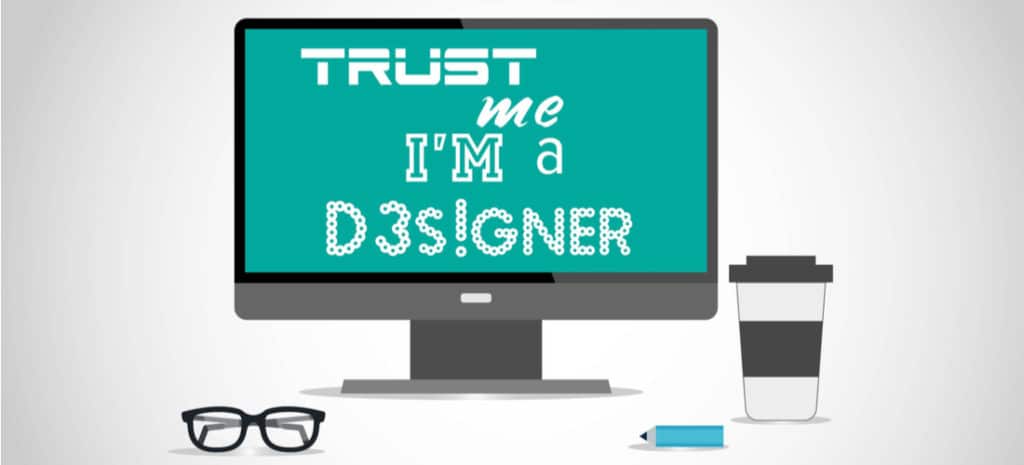Reputation might not be something you think about in relation to your website, as it’s generally considered a more personal issue. However, the way users perceive your site can play a significant role in its ongoing success.
Trust is a crucial part of any relationship, and that holds true for the “relationship” between your business and your target audience. Although building credibility takes time, there are many simple techniques that will set you on the right path.
In the absence of face-to-face communication, all consumers will have to make that connection is your website. For this reason, it’s vital to make a strong first impression.
Failing to do so could lead to numerous issues further down the line, especially concerning conversions. This is because trust impacts the number of sales you’ll make. Just think about it: If you’re running an online business, you’ll likely be asking people to hand over personal information, such as credit card details. They simply won’t do this if they don’t trust you.
Users are more likely to convert with a brand they deem credible, and are also more likely to recommend that service to a friend. Without reliable conversions, you won’t generate steady income. That’s going to make it hard to continue running your website effectively. Therefore, both the success of your site and the business itself rely strongly on trust.
Many things can make a site seem untrustworthy, although website design is often a major factor. It takes about a tenth of a second for visitors to form an opinion of your site, 94% of which is based on design alone. Sparse social media accounts and lack of appropriate security can also contribute. Fortunately, there are ways to alleviate these types of problems.
Improve Your Website’s Security
As we’ve seen, there are a number of factors that go into a user’s decision to trust your website (or not). Let’s start by exploring one of the most vital – security.

It’s likely that you’ll have encountered Secure Sockets Layer (SSL) certificates numerous times, as many websites now use them. However, you may not be aware of just how important they are when it comes to establishing trust.
An SSL certificate establishes a secure connection between your site’s server and visitors’ browsers. This keeps your customers’ information safe – which is especially important given the rising number of cyber attacks. What’s more, studies have shown that 84% of website visitors would abandon a purchase if they knew the data would be sent over an unsecured connection.
Adding an SSL certificate to your site changes its URL prefix from http to https, and prompts many browsers to display a “secure” icon in the address bar. This means anyone who visits your site will be assured that it’s fully secure. Properly securing your site can also help with your Search Engine Optimization (SEO) efforts, as Google considers sites that have an SSL certificate to be more trustworthy.
SSL certificates come in many forms, and the one you require will depend on the individual needs of your site. The price also varies from option to option, although Let’s Encrypt offers a basic SSL certificate free of charge. Most hosting providers will also include a certificate automatically with their plans, or offer it as an optional add-on.
Display Social Proof
Social proof refers to the psychological phenomenon in which people conform to the actions of others, under the assumption that those actions reflect the “correct” behavior. It can take many forms, although user reviews and testimonials are among the most effective.
Studies have found that 92% of people will trust a recommendation from a peer, and 70% will trust one from a complete stranger. Put simply, adding customer feedback to your site is an excellent way to build credibility, and conversions as a result.
Depending on what platform you’re using to run your website, you can probably find a tool that will vastly simplify the process of adding reviews to your site. If you’re a WordPress user, for example, Strong Testimonials is a particularly useful solution. Tools like this will enable you to display existing user feedback, and even make it easy for new customers to submit their own.
Focus on Strong Design
We all know how important strong web design is. However, the way you design your site shouldn’t be based on aesthetic preferences alone. Your website’s “look” can also play a huge part in establishing its reputation.

There are many ways to build trust through web design. Using consistent branding is a good place to start, and it’s also smart to provide links to your active social media profiles. Including well-written About Us and Contact pages is another effective way to build your credibility.
What’s more, 44% of visitors will leave if a site does not include the company’s phone number or other contact information. Introducing your business and team will help users get to know who you are, and encourage them to reach out. After all, it’s much easier to trust a website when there’s a human touch.
Although establishing a high level of credibility can be a lengthy process, it’s an essential part of your website’s success. Without it, visitors are unlikely to become paying customers. Fortunately, by introducing social proof, providing contact information, and implementing stronger security, you can begin to build a trusting relationship with your audience.
Do you have any questions about how to implement the techniques we’ve introduced here? Let us know in the comments section below!





Join the conversation